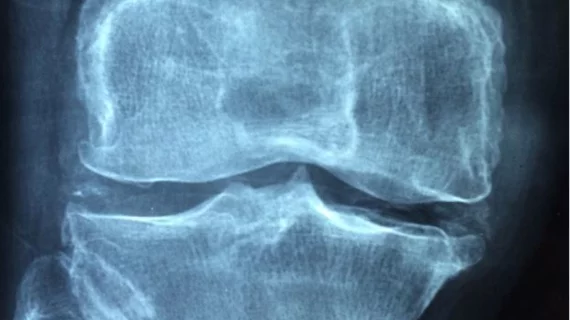Use of NSAIDs 'should be revisited' after study reveals they may worsen arthritis
The use of NSAIDS such as ibuprofen and naproxen might not have the desired effect patients are seeking when it comes to joint pain. In fact, the anti-inflammatory pain relievers may actually worsen inflammation in the long-term.
That’s according to a new study set to be presented at RSNA 2022, the annual meeting of the Radiological Society of North America (RSNA), later this month.
Lead author of the study, Johanna Luitjens, MD, a postdoctoral scholar in the Department of Radiology and Biomedical Imaging at the University of California, San Francisco, and a team of researchers recently conducted an analysis of more than 1,000 patients to better understand whether the use of NSAIDs among patients with osteoarthritis had any long-term impact on their joint structure. They based the results of their study on findings visualized on MRI scans of the participants’ knees.
“NSAIDs are frequently used to treat pain, but it is still an open discussion of how NSAID use influences outcomes for osteoarthritis patients,” Luitjens said. “In particular, the impact of NSAIDs on synovitis, or the inflammation of the membrane lining the joint, has never been analyzed using MRI-based structural biomarkers.”
Their study compared the imaging of 277 participants from the Osteoarthritis Initiative cohort—all of whom reported sustained use of NSAIDs for at least one year—with scans from a control group of 793 participants with no history of NSAID use. Each participant underwent baseline 3T MRI exams in addition to repeating the exam four years later.
After reviewing the scans for inflammatory biomarkers, such as cartilage thickness, composition and other MRI measurements, the experts were unable to find any evidence that long-term NSAID use was beneficial in reducing inflammation of the knee joint. In fact, they found that the opposite was true—that the group of patients with sustained NSAID use actually exhibited worse joint inflammation and cartilage quality in comparison to the control group on both baseline and follow-up imaging.
Based on these results, Luitjens and colleagues determined that the use of NSAIDs did not prevent inflammation of the joint, nor did it slow the progression of osteoarthritis in the knee. Though the experts indicated that there could be a number of factors that could explain their findings and that further research is warranted, they did suggest that the use of NSAIDs as a protective mechanism against inflammation “should be revisited.”
To learn more, click here.
Additional coverage of RSNA 2022 is available here and here.

